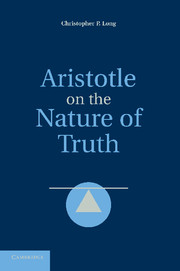Book contents
- Frontmatter
- Contents
- Prolegomenon
- Aristotle on the Nature of Truth
- 1 The Saying of Things
- 2 A History of Truth as Cor-respondence
- 3 Saving the Things Said
- 4 By Way of Address
- 5 By Way of Response
- 6 The Truth of Nature and the Nature of Truth in Aristotle
- 7 On Saying the Beautiful in Light of the Good
- 8 Ecological Justice and the Ethics of Truth
- Works Cited
- Index of Passages Cited
- General Index
4 - By Way of Address
Lending Voice to Things
Published online by Cambridge University Press: 06 December 2010
- Frontmatter
- Contents
- Prolegomenon
- Aristotle on the Nature of Truth
- 1 The Saying of Things
- 2 A History of Truth as Cor-respondence
- 3 Saving the Things Said
- 4 By Way of Address
- 5 By Way of Response
- 6 The Truth of Nature and the Nature of Truth in Aristotle
- 7 On Saying the Beautiful in Light of the Good
- 8 Ecological Justice and the Ethics of Truth
- Works Cited
- Index of Passages Cited
- General Index
Summary
For things to go into language is as a going just as much of a going on their part, and just as natural, as their going into air or water, up or down, or from seed to flower.
Frederick Woodbridge, Aristotle's Vision of NatureIf truth is an offspring of the symbiotic relationship between the ways things express themselves and the ways they are said, it is because truth is rooted in a λόγος attuned to the appearing of phenomena. Aristotle's name for the sort of saying that addresses things by allowing them to show themselves as themselves is λόγος ἀποφαντικός – declarative saying. The question concerning truth in Aristotle announces itself implicitly as a matter of justice when his account of declarative saying is heard as an attempt to articulate a way of addressing the appearing of things held ultimately accountable by the ways things express themselves. This way of address is grounded in an ability to lend articulate voice to that which speaks with inarticulate eloquence. It is cultivated by an attentiveness that seeks to articulate things as they show themselves to be. In order to discern this way of address in Aristotle, it will be necessary to begin by attending to the way voice brings Aristotle's account of declarative saying to life.
Aristotle addresses the meaning of declarative saying in De Interpretatione, a text that seems on the face of it to treat λόγος in isolation from the life that gives it voice.
- Type
- Chapter
- Information
- Aristotle on the Nature of Truth , pp. 72 - 115Publisher: Cambridge University PressPrint publication year: 2010



